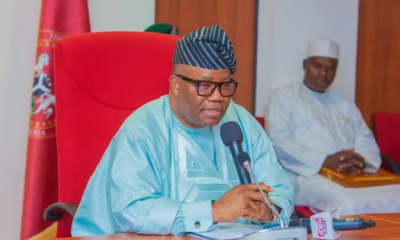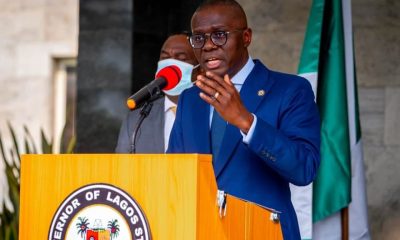News
Allegation of missing N16bn untrue – Oyo-Ita
Published
5 years agoon
By
Olu Emmanuel
By Odimmegwa Johnpeter/Abuja
Mrs. Winifred Oyo-Ita, Head of the Civil Service of The Federation (HCSF), has dismissed as untrue the allegation of missing N16bn meant for civil servant Group Life Insurance Scheme (GLIS) in her office.
Recall that an online news platform, Leading Reporters Nigeria had published a report alleging that N16bn meant for GLIS was missing in Oyo-Ita’s office.
Reacting to the report at the stakeholder’s forum on the review of public service rule (PSR), Mrs. Oyo-Ita stated that her office has never received any fund meant for the scheme neither is it aware of any missing funds.
The head of service who said the news peddlers do not have the idea of how the group life scheme works, said all the funds meant for the scheme are domiciled at the Accountant General of the Federation’s Office, also stressed that the only thing her office does in the process is to compile the names of beneficiaries and approved underwriters.
“The issue of Sixteen Billion Naira gone missing in the office of the head of service is strange to me and many others who understands how the group life scheme works. At no time is any amount of money, not even a kobo was given to the office of the head of service to pay for group life. It is the underwriters who through the brokers pay group life to the beneficiaries of the next –of –kin of any public servant that has lost his life during the cause of his/her being a public servant”.
“The funds for that programme are always domiciled at the Office of the Accountant General of the Federation (AGF). The only thing the office of the head of service does is to compile the names of all the parastatals, ministries, departments and agencies that are to be under the group life policy. When we do that, we now write to the AGF and give the list of underwriters that are being approved and regulated by National Insurance Commission, it is the AGF office that makes direct payment to these underwriters”, she said.
While revealing that the on-going Public Service Review is the most inclusive one since the inception of the review process, she said the recent review was long overdue as the last time the process was held was 12 years ago instead of the usual 5 years interval stipulated for the review.
End.
Reasons for low productivity in federal civil service – Oyo-Ita
Odimmegwa Johnpeter/Abuja
Mrs. Winifred Oyo-Ita, Head of the Civil Service of The Federation, said that the low productivity in the federal civil service was largely due to lack of conducive work environment of employees, inadequate office equipment and power supply among other things.
According to Oyo-Ita, an average Nigerian worker irrespective of age and education has a residual desire to be productive, but has many factors to content with. This, she disclosed in Abuja while launching the “Culture Change Diagnostic Survey Report”, prepared by Culture Change Management Team (PMT) of the office of the Civil Service of the Federation.
“Prevailing perceptions of Federal Civil Service (FCS) work environment include: inadequate office equipment, office space and work tools, un-conducive work environment for employees, including the physically challenged, inadequate sanitary, safety and precautionary facilities, and poor lighting, ventilation and power supply”, she said. She also stressed that the present administration had already mapped out some strategic plans to rehabilitate the deteriorating federal secretariat, as a measure to giving workers a more conducive environment for improved productivity.
Oyo-Ita explained that the Culture Diagnostic Survey Report was part of efforts of her office to identify some of the inhibitions to the productivity expected from civil servants and the needed solutions to them. She added:
“This culture diagnostic survey report is a result of a thorough consultative process among relevant stakeholders and presents the analysis to understand the baseline behaviour and culture in the service as well as define core values that deconstruct what an EPIC Civil servant should be.”
While she clarified that the cost of maintaining the Federal Secretariats was more than what monthly overhead of her office could handle, she also assured that the rehabilitation work has been captured in 2019 budget of the Ministry of Power Works and Housing. She said: “On the work environment, we are already working with the Federal Ministry of Power Works and Housing. As the Ministry that oversees all the Federal Secretariats, there is provision for the rehabilitation of the Secretariats in 2019 budget of the Ministry.
End.
Nigeria calls for more commitment to labour policies in ECOWAS
Odimmegwa Johnpeter/Abuja
Nigeria has urged Member States of the Economic Community of West African States (ECOWAS) to employ commitment and political will in the implementation of labour policies and programmes in the sub-region.
The Permanent Secretary, Federal Ministry of Labour and Employment, William Alo, made the call at the Meeting of Ministers in Charge of Labour and Employment in the ECOWAS sub-region, in Abuja.
He noted that the sub-region needed renewed commitment and passion to drive the tenets of Decent Work and other labour policies.
According to him, “We cannot continue to be paying lip service to issues of labour administration in the sub-region. The time has come for us to make a radical departure from the past if we are to bequeath onto future generation an ECOWAS sub-region that prides itself in the attainment of the tenets of decent work.”
He hoped that the Meeting would approve all the proposals presented by the General Assembly, and then go back home to transform them into programmes of action to deepen decent work in the sub-region.
The Meeting of Labour Experts/General Assembly of ECOWAS Social Dialogue Forum, which held from 16th – 18th July in Abuja was convened to review, validate and adopt key policy texts on labour and employment; build consensus on topical issues, amongst others.
The Permanent Secretary pledged the continued support of Nigeria to the ECOWAS Commission in its determination in addressing knotty employment and labour issues in the sub-region.
In an address, the Commissioner, Social Affairs and Gender, ECOWAS Commission, Dr Siga Fatima Jagne, said the Meeting was for Labour experts to submit their priorities and recommendations for the attention of the Ministers of Labour and Employment.
She stated that the Social Dialogue Forum, which preceded the Ministers’ Meeting, had deliberated, revised, validated and adopted the Directive on Minimum Standards towards Harmonization of Labour Laws in the ECOWAS Region, and ECOWAS Regional Program for Decent Work (DWRP).
”The two documents will be the key frameworks that ECOWAS and Member States can apply to achieve the ILO Centenary Declaration for the Future of Work adopted by the Conference at the 108th Session held in June, 2019; and will specifically address the challenges to shape a fair, inclusive and secure future of work with full, productive and freely chosen employment and decent work for all”, she said.
She urged the Ministers to adopt the text that would be presented to them and all the recommendations therein to enable the ECOWAS Commission put in place regional mechanisms to facilitate and enhance the social integration of citizens in the Community and create conditions for decent and regulated jobs at Member States’ level without xenophobia and other forms of discrimination.
In an opening remark, the Minister of Labour and Employment of Niger Republic, Mohammed Bil Omar, stated that the recommendations of the General Assembly Meeting would strengthen social dialogue in the sub-region.
Speaking, Regional Director of ILO, Dennis Zulu, urged the Ministers of Labour and Employment in ECOWAS region to ensure that decent work was guaranteed for citizens of the sub-region.
Trending

 Latest3 days ago
Latest3 days agoObi advocates productivity, leadership commitment as invaluable insights for nation’s growth, as in Brampton, Canada

 Crime4 days ago
Crime4 days agoFuel scarcity: Trigger-happy policeman fatally shoots man who try to stop him from jumping queue at a filling station

 Agribusiness6 days ago
Agribusiness6 days agoGMO crops will render Africa farmers more reliant on multinational corporations

 Business1 week ago
Business1 week agoNNPC says fuel queues to be cleared by Wednesday

 Business4 days ago
Business4 days agoCourt stops NERC from implementing tariff hike for Band A customers

 Agribusiness4 days ago
Agribusiness4 days agoRebuttal of claims on safety, benefits of GM crops

 Featured1 week ago
Featured1 week agoNigeria confronted with multifaceted challenges – Akpabio

 Business4 days ago
Business4 days agoLagos now Africa’s 7th largest economy as GDP soars to N41trn

